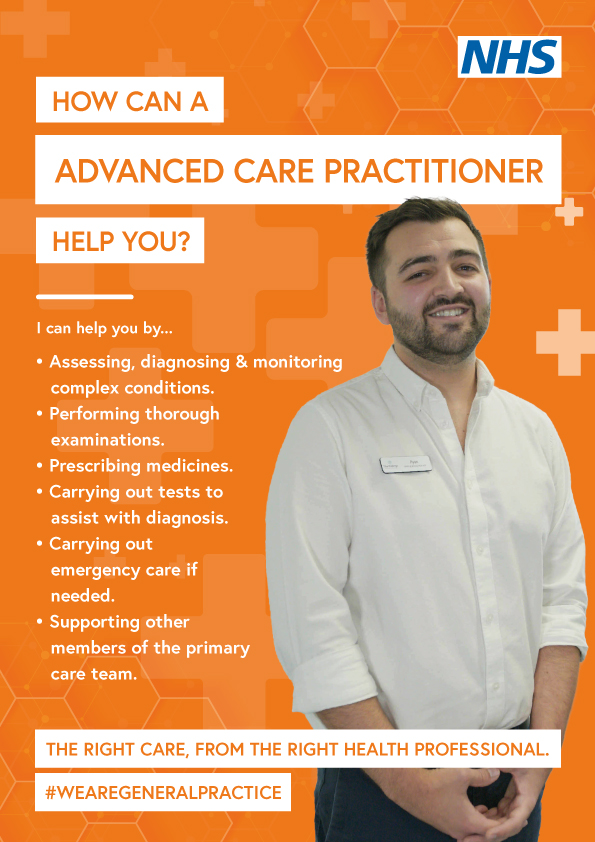Advanced practice embodies the ability to manage clinical care in partnership with individuals, families and carers. It includes the analysis and synthesis of complex problems across a range of settings, enabling innovative solutions to enhance people’s experience and improve outcomes.
Health Education England (2017) defines Advanced Clinical Practice as: “Advanced practice is delivered by experienced, registered health and care practitioners. It is a level of practice characterised by a high degree of autonomy and complex decision making. This is underpinned by a master’s level award or equivalent that encompasses the four pillars of clinical practice, leadership and management, education and research, with demonstration of core capabilities and area specific clinical competence.”
An AP works at Agenda for Change band 8a or above
| Key roles and responsibilities | Education and training requirements |
Recommended minimum supervision |
Depending on profession:
|
Educated to master’s degree level* in the relevant area of expertise so that work encompasses the four pillars of clinical practice, leadership and management, education, and research
* Advanced clinical practitioner nurses must have completed an accredited MSc advanced practice programme or the HEE e-Portfolio (supported) process |
Monthly supervision can be provided by a GP, experienced advanced practitioner or consultant practitioner of the corresponding professions |
Description of Role
An advanced practitioner reimbursement tier may apply to the following PCN roles: Clinical Pharmacist; Physiotherapist; Occupational Therapist; Dietician; Podiatrist and Paramedic. To be reimbursable at band 8a, this role needs to have the following additional minimum requirements, plus these extra responsibilities.
Training Requirements
The PCN must ensure that the practitioner both:
- Is educated to master’s degree level in relevant area of expertise; and
- Has the capabilities of advanced clinical practice set out in section one of the Multi-professional Framework for Advanced Clinical Practice in England. https://www.hee.nhs.uk/sites/default/files/documents/multi-professionalframeworkforadvancedclinicalpracticeinengland.pdf
Clinical Responsibilities
The PCN must ensure that each band 8a advanced practitioner has the following additional responsibilities:
- They will assess and triage patients, including same day triage, and as appropriate provide definitive treatment (including prescribing medications following policy, patient group directives, NICE (national) and local clinical guidelines and local care pathways or make necessary referrals to other members of the primary care team
- They will be able to manage undifferentiated undiagnosed conditions and identify red flags and underlying serious pathology and take appropriate action
- They will use complex decision making to inform the diagnosis, investigation, and complete management of episodes of care within a broad scope of practice
- They will actively take a personalised care approach and population centred care approach to enable shared decision making with the presenting person
- They will have completed the relevant training in order to provide multi-professional clinical practice and CPD supervision to other roles within primary care, for example first contact practitioners and the personalised care roles.
Table to show capabilities across Band 7 and Band 8a (AfC) in Primary Care.
| First Contact Practitioner Band 7 | Advanced Practitioner Band 8a |
| Manages undifferentiated undiagnosed conditions. | Manages undifferentiated undiagnosed conditions. |
| Able to identify red flags and underlying serious pathology and take appropriate action. | Able to identify red flags and underlying serious pathology and take appropriate action. |
| Works within practice, across PCN, multiorganisational, cross professions and across care pathways and systems including health, social care, and the the voluntary sectors. | Works within practice, across PCN, CCG and ICS, multi organisational, cross professionals and across care pathways and systems including health, social care, and the voluntary sectors. |
| High level complex decision making to inform the diagnosis, investigation, management, and on referral within scope of practice. | High-level of complex decision making to inform diagnosis, investigation complete management of episodes of care within a broad scope of practice. |
| Actively takes a personalised care approach to enable shared decision making with the presenting person. | Flexible skill set to adapt to and meet needs of the PCN Population and support public health |
| Contributes to audit and research projects. | Manages medical complexity. |
| Contributes to education and supervision within their scope of practice for the multi-professional team. | Actively takes a personalised care and population centred care approach to enable shared decision making with the presenting person. |
| Facilitates interprofessional learning in area of expertise. | Actively engages in care from a Population care viewpoint. |
| Promotes and develops area of expertise across care pathways. | Leads audit and research projects. |
| Working toward Advanced Clinical Practice (level 7 across all 4 pillars). | Leading audit within areas of capability. |
| Provides multi-professional AP clinical and CPD supervision across all four pillars with relevant training. | |
| Leads education in their area of expertise. | |
| Enables, facilitates, and supports change across care pathways and traditional boundaries | |
| Working toward level 8. |

